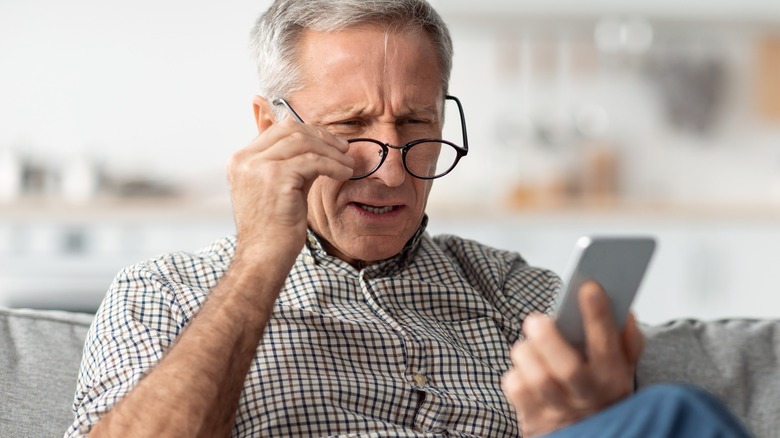What Happens When You Squint Your Eyes Too Much
Only around one-third of adults have "perfect" 20/20 vision without using any form of visual correction (via the University of Iowa). The rest of us have varying degrees of visual problems, ranging from mild to severe. However, around 75% of people can attain 20/20 vision by using some form of visual correction.
The most common visual problems are refractive errors such as nearsightedness and farsightedness. People with these problems typically need glasses or contact lenses in order to see well. In some cases, they may even resort to surgery, according to the Centers for Disease Control and Prevention (CDC).
In the absence of visual correction, many people with vision problems resort to squinting in order to see better. Per the University of California, squinting works because it reduces the amount of light let into the eye, allowing the eye to focus better on the light that is let in. While it may improve our vision temporarily, can it do more harm than good?
Squinting can cause headaches, but likely won't cause long-term damage
Many people believe that squinting can make eyesight worse in the long run. In an interview with Express, Robert MacLaren, a professor of ophthalmology at the University of Oxford, states that this is a myth, and that squinting will not damage your vision. However, squinting does require the contraction of a lot of facial muscles, so you could end up with headaches if you do it too much. Moreover, dermatologist Annie Chiu tells Allure that squinting a lot can eventually lead to wrinkles.
While squinting will not cause any long-term damage to your eyes, it is definitely uncomfortable. It should also be viewed as a sign that you need to get glasses or contacts, start wearing your glasses or contacts, or get a stronger prescription, per the experts at Smart Vision Labs. Other signs that you need to see an eye doctor include eye strain, headaches, needing to rub your eyes a lot, and holding things as close to or as far from your eyes as possible to see better (via All About Vision).


